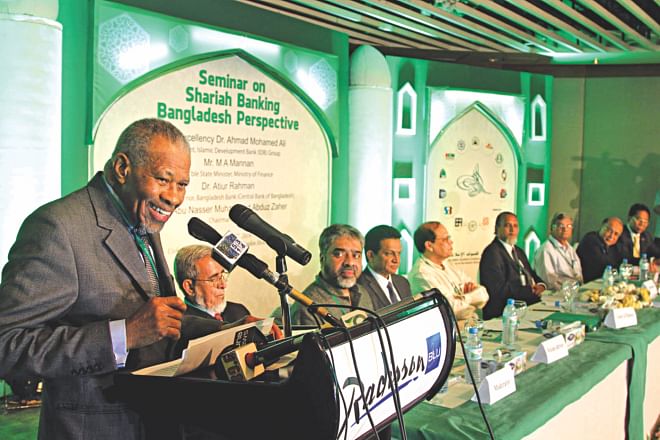Islamic banking coming of age

Islamic banking is now recognised as a mainstream activity not just in Muslim-majority countries but also in global finance, Bangladesh Bank Governor Atiur Rahman said yesterday.
In Bangladesh, Islamic banking constitutes about a fifth of the total banking market, Rahman said.
He spoke at a seminar on shariah banking, organised by the Islamic Banks Consultative Forum (IBCF), a forum of the Islamic banking industry, at Radisson Hotel in Dhaka.
Islamic banking has been gaining ground in the post-global financial crisis period because of its in-built risk sharing, speculation-averseness, value driven features, he said.
The Islamic banking industry is one of the fastest growing sectors of the international financial system, said M Azizul Huq, an Islamic banking consultant.
Deposits with Islamic banks in the country grew by 25.60 percent in the last five years till 2013 as compared to 22 percent for conventional banks, he said during a keynote presentation.
Growth of investment for the same period of conventional banks was 20 percent against 24.60 percent for Islamic banks, he said. Total deposits of the Islamic banks and windows in December 2013 stood at Tk 1.198 trillion, holding market share of 19.3 percent.
In the mid-1990s, the size of the world Islamic finance assets stood at $150 billion, which has reached $1.80 trillion at the end of 2013, he said.
The value of Islamic finance assets is estimated to reach $6.5 trillion in 2020, Huq said.
Shariah banking is steadily growing in socially responsible financing roles of trade and output activities in the country's economy, including under-served and un-served sectors such as agriculture and micro, small and medium enterprises, Rahman said.
The self-regulation and oversight of its shariah compliance practices are delegated to the shariah-based financing community, he said.
“This has served well thus far in providing a level playing field for shariah-based financing alongside the conventional options.”
“BB acted early on towards introduction of a government Islamic investment bond of six-month tenure to facilitate liquidity management of Islamic banks, introduction of another similar instrument of three-month tenure for further facilitation is at the final stage.”
Currently eight full-fledged Islamic banks and 15 conventional local and foreign banks with 825 Islamic branches and windows are operating in the country with a market share of 22 percent in assets and 19 percent in deposits.
With the effort of IBCF, the Shariah Board is now successfully functioning in Bangladesh, said Ahmad Mohamed Ali, president of Islamic Development Bank.
The issuance of shariah banking and money market guidelines by the central bank will help achieve further economic growth of the country through influx of additional foreign direct investment and employment generation, Ali said.
MA Mannan, state minister for finance,, also spoke.

 For all latest news, follow The Daily Star's Google News channel.
For all latest news, follow The Daily Star's Google News channel. 



Comments